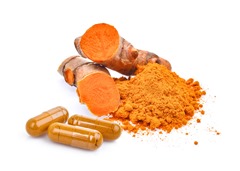We know many things about therapeutic benefits of Turmeric and the most abundant curcuminoid constituent, curcumin. A recent review article examines more closely the randomized, controlled trials (RCTs) of "curcumin" in the treatment of autoimmune and rheumatic diseases.
curcumin. A recent review article examines more closely the randomized, controlled trials (RCTs) of "curcumin" in the treatment of autoimmune and rheumatic diseases.
Using the methodology of searching the PubMed data base for key words, a total of 32 RCTs met the inclusion criteria for this review of studies published between 2008 and 2018.
There were 16 RCTs and a total of 1,480 individuals using curcumin for osteoarthritis (OA). These 16 trials used doses of curcumin between 100-2000 mg/day for 6-32 weeks. Twelve were placebo-controlled, and four used positive controls including non-steroidal anti-inflammatory drugs (NSAIDs) and the dietary supplements glucosamine hydrochloride (GH) and chondroitin sulfate (CS). The studies evaluated either curcuminoid extracts, a specific ratio of more than one curcuminoids or a combination of curcumin with boswellia. Two of the studies only evaluated laboratory findings rather than clinical results such as pain, swelling or mobility. Of the 14 RCTs that assessed clinical outcomes, 13 reported significant improvements in at least two areas. The average dose was 834.3 mg/day.
The most common improvements were increased walking distance and decreased Western Ontario and McMasters Osteoarthritis Index (WOMAC) score. One of the positive trials found that 1000 mg/day curcumin alone was not as effective as a combination of 950 mg/day curcumin plus 450 mg/day boswellic acid.
One study compared GH plus CS to 500 mg/day curcumin plus GH for 16 weeks and found significant clinical improvements in the curcumin group. In the 3 trials that used NSAIDS in comparison, 2 reported that curcumin effectiveness was similar to NSAIDS and one found it was superior.
Three of the 5 studies that measured serum levels of inflammatory markers, had significant decreased with the curcumin.
This paper also reported on type 2 diabetes mellitus (T2DM) and as a brief summary here, curcumin did have anti-diabetic effects, improved glucose metabolism and insulin resistance, decreased key inflammatory markers and decreased progression to T2DM in those who were pre-diabetic. The authors conclude "the studies showed that curcumin supplementation possesses anti-diabetic effects and improves T2DM parameters in patients."
This review paper also reported on three placebo controlled RCTs in patients with ulcerative colitis (UC). Two of the studies, which evaluated 2000 mg/day and 3000 mg/day curcumin, reported significant improvements in at least three clinical outcome measures. One study using a much lower dose of 450 mg/day curcumin for 8 weeks reported no significant improvement.
The two small RCTs of RA and curcumin reported that in one, 1000 mg/day curcumin for eight weeks improved disease activity score and pain levels but had no effect on laboratory markers while the other using 1300 mg/day curcumin for two weeks had no effect at all. One small study was evaluated in patients with lupus nephritis. At 1500 mg/day turmeric (66.3 mg/day curcumin) for 12 weeks, there was a significant decrease in proteinuria, systolic blood pressure, and hematuria.
Commentary: With this many positive trials on the benefits of curcumin in the treatment of OA, the comparable results to NSAIDS, with fewer adverse events, make it a first choice for relief of pain and swelling and improved function. The studies in pre-diabetics and T2DM are also encouraging, but longer-term studies would be helpful in understanding the true potential. AI illnesses such as RA and UC are very complex with serious consequences. While the curcumin research is small in these areas, a multi-faceted treatment program can easily include curcumin but not at the expense of other well thought out management and treatment options. Curcumin products very widely from simple curcumin powders/liquids/tinctures to those formulated with enhanced bioavailability methodologies. In time, we are likely to better understand how/when/in whom to select which curcumin formula and what dosage.
Reference: Yang M, Akbar U, Mohan C. Curcumin in autoimmune and rheumatic diseases. Nutrients. May 2019;11:1004. pii: E1004. doi:10.3390/nu11051004.

